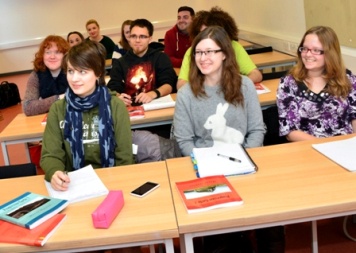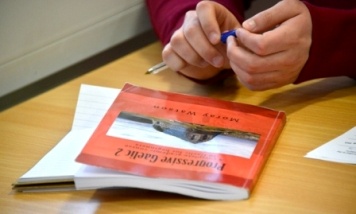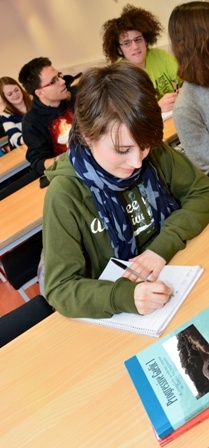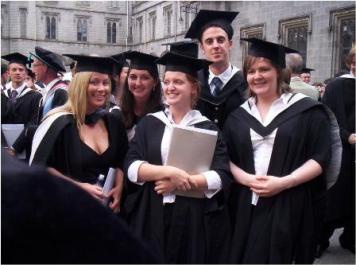- Overview
-

We teach courses in Gaelic language, culture and literature and cater for all levels of fluency, including beginners.
Gaelic Studies offer joint honours and combined MA degrees at undergraduate level. You can also learn Gaelic alongside your core degree discipline in first and second year as part of the University's Sustained Studies options.
Here you will find information about how the Gaelic degree is structured and how you might chose Gaelic as an additional subject in your first year of study. Also take the opportunity to attend an open day hosted by the university so you can visit us and experience life on campus and in the city.
You might only study with us for a semester, or for the duration of your undergraduate degree. Whichever path you follow, we offer you the opportunity to learn more about Scotland's oldest living language, and to develop your Gaelic skills in a friendly and supportive environment.
- Gaelic Degree
-
Here you can find out more about your options to study Gaelic as part of your degree at Aberdeen.
- How is the MA in Gaelic Studies structured?
- Which Gaelic language stream is for me?
- What can I study alongside Gaelic?
- Can I still study Gaelic as part of a Celtic degree?
How is the MA in Gaelic Structured?
Gaelic Studies concentrates on modern Scottish Gaelic language, literature and society. There are two language streams in the degree course: for absolute or near beginners, and for those with Higher Gaelic (learners) or with Higher Gàidhlig (native speakers).
The beginners' intensive course helps students work towards fluency in both reading and writing in as short a time as possible, while the courses for those who have done Gaelic already focus on improving accuracy and increasing students' vocabulary and range of expression.
In addition to the language, from first year onwards our students have the chance to learn about areas like folklore, literature, language planning, linguistics and sociolinguistics. You also study subjects in other disciplines, alongside Gaelic. The MA in Gaelic Studies can be taken as a joint honours programme or a Major-Minor Honours degree: see the options here.

Students with little or no Gaelic study an intensive beginners course in Years 1 and 2.
The beginners course follows a structured programme of language classes, based on a custom-written textbook series called 'Progressive Gaelic', by Prof Moray Watson.
Students with prior knowledge of Gaelic, whether as native speakers, from Gaelic-medium education or as advanced learners, follow a more advanced stream which enhances and expands their skills in the language and knowledge of how the language works.

In the first two years, your compulsory studies in Gaelic will take up only some of your study, and you choose other subjects to study alongside. So, it is important that you consider the broad range of subjects you might like to take before you arrive (see the Catalogue of Courses).
At Aberdeen, our Gaelic degree is offered as a Joint-Degree programme, so you can choose from Year 1 to have two main areas of study. The following information will help you identify what other subjects you can study with Gaelic to honours level.
Joint Honour Degrees in Gaelic
- MA in Gaelic Studies - Joint Programme: with Anthropology, Business Management, Celtic and Anglo Saxon Studies, Economics, , English, Film and Visual Culture, French, Geography, German, History, Language and Linguistics, Politics, Sociology, Spanish, or Theology and Religion.
- MA Combined Honours (with Gaelic as the 'minor' component') with Education, International Business, Music, Mathematics or Psychology.
- LLB (Law) with Gaelic
For information about compulsory courses, see the Programme Specifications from Registry.
Can I still study Gaelic as part of a Celtic degree?
Students who wish to do Gaelic throughout their studies can do a joint degree in Gaelic and Celtic & Anglo-Saxon Studies .
Students who wish to do Celtic & Anglo-Saxon Studies as single honours or joint with another subject, can take some Gaelic courses at levels 1 and 2.
- Enhanced Study
-
Enhanced study options give you the opportunity to study Gaelic alongside your core degree discipline. All single honours undergraduate degrees at Aberdeen, with the exception of Medicine and Dentistry, include Enhanced Study options. Here you will learn more about how you can study Gaelic.
Sustained Study in Gaelic
Gaelic is one of the Sustained Studies courses offered to students entering at Level 1. To have Gaelic on your degree transcript, you need only take one language course per semester for the first two years of your degree. Students join the Gaelic language course appropriate to their level of Gaelic language skills at Level 1 and, if they complete our Level 1 courses successfully, students continue into Level 2 Gaelic language. Studying the Gaelic language for two years is likely to enhance your employability in Scotland, and in the Highlands and Islands region in particular.
Discipline Breadth in Gaelic
You may expand the scope of your study by taking a Discipline Breadth course - which is a course that is outside your degree discipline. Students can choose to study courses in Gaelic Studies alongside their core degree discipline during their first two years of study as part of their DisciplineChoice and Flexibility Breadth study. Students join the Gaelic language course appropriate to their level of Gaelic language skills at Level 1 and, if they complete our Level 1 courses successfully, students continue into Level 2 Gaelic language.
- Careers
-
Graduate employability is excellent in Gaelic. Graduates of our degrees find themselves in a wide range of interesting, exciting and challenging careers.
Our graduates are generally in high demand. We maintain links with employers, government bodies and other organisations with a history of employing our graduates, and we use these links to inform and improve our courses on a continuing basis.
Our Recent Graduates
Recent graduates, among other things, are currently:

- Studying for several PhDs, both in Aberdeen and also internationally
- Working in art, design and digital production
- Working in Gaelic media
- Teaching in Gaelic Medium Education
- Working for Iomairt Loch Abair
- Publishing a novel
- Working in Gaelic archives
- Training to be teachers.
